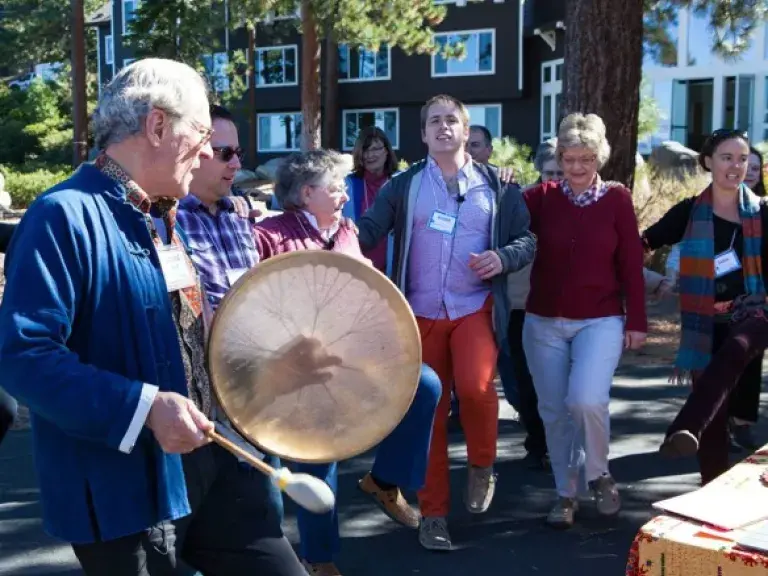
As an Episcopal priest you have been a strong advocate for breaking down the barriers to singing—both in church and in the community. What got you interested in this?
Rick Fabian and I started St. Gregory of Nyssa Episcopal church in 1978 and for a number of years we were worshipping in another church’s space where we sang the liturgy unaccompanied. When we were building our own church, there was a plan for an organ. But after we moved in, a whole lot of people said, “We don’t want an organ.” That raised the question, “What are we accomplishing by singing unaccompanied?” Somehow it was touching people, so how does singing build community?
We later started having Music That Makes Community workshops out in the community. We found that pulling off this kind of unaccompanied singing requires a leader. But what is that leader doing? I have come to believe that he or she is calling forth the song that is already there.
There are a lot of people that will tell you that they can’t sing. John Bell, a Church of Scotland minister, calls that vocal disenfranchisement. People need to know that the invitation to sing is actually to them.
What is your own history of singing?
I grew up in a fundamentalist church with a lot of singing, some that I liked and some that I disliked intensely. In looking for an alternative religious universe, I started digging around for religious music from anywhere I could get it. Listening to lots of different kinds of music became the path out.
Singing was part of our daily chapel in my years as a college chaplain at Yale. Undergrads were drawn to what we were doing because they liked to sing. We gave them lots of unaccompanied singing.
I learned in seminary that in all likelihood ancient liturgy was sung. It never seemed to me that music was decorative. Music is a spiritual practice, and a pervasive one, and we don’t do it that way as much as we could.
Can music be a spiritual practice for someone who isn't involved in a church?
Of course. If you think of the civil rights movement, the anti-apartheid movement, the labor movement, the anti-war movement, music was right there. A lot of stuff stalled and lost its way when the music stopped. The music stopped, I think, when people began to think of themselves as consumers of music, rather than musicmakers.
So how do you issue that invitation to people to make music?
In Music That Makes Community workshops, people come who are at all levels. We tell them that everybody is going to learn from everybody else—which drives a few trained musicians really nuts! We have some who show up who are profoundly disenfranchised as singers. It is a setting where they can find their voice. If they can get up and sing and sing with someone else, that is a breakthrough.
One way you invite people in is by not using song sheets. How does that work?
Going paperless levels the playing field completely. So the people who say, I am not a musician, I cannot sing, and I can’t read music—those barriers are gone.
Cognitively, when we give people a piece of text and notated music we are asking them to read two different abstract symbol systems simultaneously and to synthesize them. This is not the music. In a call and response, we are teaching people the piece and we are making music as we do it. Learning is present in the making of the music. It is much more immediate. This is the music. It unfolds over time as we listen to it, create it in our memory. We are in a process that is closer to the music itself when we are not on paper.
How do church musicians with choirs and organs incorporate this paperless approach?
If you have a great organ and a great choir, there are still times when perhaps the organ can go silent and the people can experience singing together. Something happens when the transmission of music is happening person to person. It invites people who can’t or won’t sing otherwise. And it challenges the trained singers to get back to that core fundamental musicianship.
Find a place to put an unaccompanied, paperless piece in your service. It will do something for people’s singing.
Why did you join Chorus America?
I wanted to read all the articles on the website! I am always on the lookout for things like singing and psychological well-being, singing and healthy aging, singing and healthy children, singing and mental development. It fascinates me.
I think singing changes human consciousness, or a better way to put it is that it changes your consciousness so that you become human. When we are making music, it activates the same parts of the brain that are active when we are in the flow, working collaboratively with people.
We are trying to give people back their sense of autonomy in mutually respectful, caring relationships. So it is not just, “fit in,” but it is to be wholly present in the moment. When we are really alive to it, we are all making our own individual contribution.
So having your own voice but with other voices?
Right. That cuts through the dichotomy that we struggle with in our society—the extremes of being able to do whatever you want on the one side, and on the other, giving over control to another. In music, the question of who is in control is not the primary question. It is like the Ubuntu song, “I am because you are.” It is a picture of a society in which it is possible to become human.
Resources
Music That Makes Community Facebook page
Music by Heart: Paperless Songs for Evening Worship.
The Singing Thing: A Case for Congregational Song and The Singing Thing Too: Enabling Congregations to Sing by John Bell.

